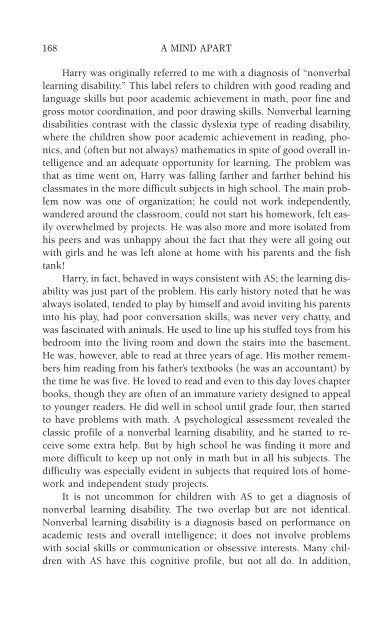978-1572305441
autism
autism
You also want an ePaper? Increase the reach of your titles
YUMPU automatically turns print PDFs into web optimized ePapers that Google loves.
168 A MIND APART<br />
Harry was originally referred to me with a diagnosis of “nonverbal<br />
learning disability.” This label refers to children with good reading and<br />
language skills but poor academic achievement in math, poor fine and<br />
gross motor coordination, and poor drawing skills. Nonverbal learning<br />
disabilities contrast with the classic dyslexia type of reading disability,<br />
where the children show poor academic achievement in reading, phonics,<br />
and (often but not always) mathematics in spite of good overall intelligence<br />
and an adequate opportunity for learning. The problem was<br />
that as time went on, Harry was falling farther and farther behind his<br />
classmates in the more difficult subjects in high school. The main problem<br />
now was one of organization; he could not work independently,<br />
wandered around the classroom, could not start his homework, felt easily<br />
overwhelmed by projects. He was also more and more isolated from<br />
his peers and was unhappy about the fact that they were all going out<br />
with girls and he was left alone at home with his parents and the fish<br />
tank!<br />
Harry, in fact, behaved in ways consistent with AS; the learning disability<br />
was just part of the problem. His early history noted that he was<br />
always isolated, tended to play by himself and avoid inviting his parents<br />
into his play, had poor conversation skills, was never very chatty, and<br />
was fascinated with animals. He used to line up his stuffed toys from his<br />
bedroom into the living room and down the stairs into the basement.<br />
He was, however, able to read at three years of age. His mother remembers<br />
him reading from his father’s textbooks (he was an accountant) by<br />
the time he was five. He loved to read and even to this day loves chapter<br />
books, though they are often of an immature variety designed to appeal<br />
to younger readers. He did well in school until grade four, then started<br />
to have problems with math. A psychological assessment revealed the<br />
classic profile of a nonverbal learning disability, and he started to receive<br />
some extra help. But by high school he was finding it more and<br />
more difficult to keep up not only in math but in all his subjects. The<br />
difficulty was especially evident in subjects that required lots of homework<br />
and independent study projects.<br />
It is not uncommon for children with AS to get a diagnosis of<br />
nonverbal learning disability. The two overlap but are not identical.<br />
Nonverbal learning disability is a diagnosis based on performance on<br />
academic tests and overall intelligence; it does not involve problems<br />
with social skills or communication or obsessive interests. Many children<br />
with AS have this cognitive profile, but not all do. In addition,



